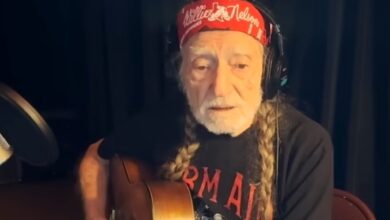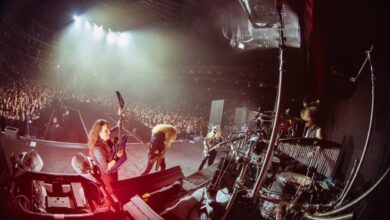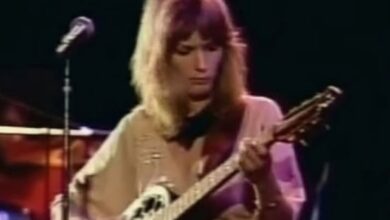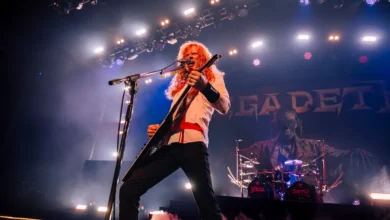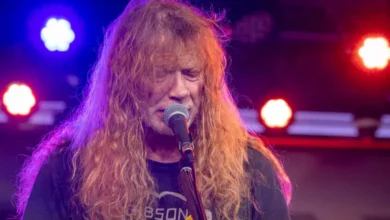46 Years Later: The Night Ace Frehley Turned KISS’s Wildest TV Moment Into Rock Legend
Internal tensions that had been simmering inside KISS finally burst into public view on October 31, 1979, during a live national broadcast that has since become legendary. The infamous appearance on Tom Snyder’s Tomorrow show has been revisited countless times over the decades, but today, in light of Ace Frehley’s passing, it resonates with an even deeper poignancy. What was once chaotic humor now feels like an immortal moment in rock history — a snapshot of four men on the edge of both fame and fracture.
The mayhem began barely twenty seconds into the interview. Ace Frehley, clearly tipsy but full of mischief, burst into uncontrollable laughter after Snyder jokingly mispronounced “bass” as “trout.” With that, he seized control of the entire show, riffing on the mistake and turning a typical late-night promo into pure, unfiltered rock theater. The crowd, the crew, even Snyder himself — all of them were caught between bewilderment and delight as the Spaceman set the tone for an unforgettable evening.
Frehley’s booming laughter, constant interruptions, and spontaneous jokes soon overpowered the rest of the band. Paul Stanley’s polite chuckles began to fade as he tried to redirect the conversation, while Gene Simmons’ glare could have melted through greasepaint. The interview quickly spiraled into something no one could control — a surreal mix of comedy, discomfort, and raw humanity that somehow captured everything KISS was: bombastic, unpredictable, and completely unscripted.
Snyder, ever the seasoned host, recognized gold when he saw it. Instead of cutting Frehley off, he leaned in, encouraging every outburst and every laugh. His producers had warned him Ace would be quiet, that coaxing words out of him might be difficult. Instead, Frehley turned the segment into a comedy routine that no one could have scripted. Snyder’s grin widened by the minute, and the audience watching at home could feel the spark of real, unfiltered television history.
Peter Criss was equally amused, doubling over in laughter at Frehley’s antics. Years later, in his autobiography Makeup to Breakup, Criss recalled the moment with pure joy: “For once, Ace and I hijacked the interview from Gene and Paul — and we loved every second.” For that brief window of time, the rhythm section, often overshadowed by their louder bandmates, took center stage. It was chaotic, ridiculous, and utterly human — the kind of live moment that defined the unpredictable magic of rock ’n’ roll.
Yet behind the laughter, cracks in the KISS empire were widening. The band was still riding high on the success of their Dynasty album, powered by the disco-infused hit “I Was Made for Lovin’ You,” and all four members had recently released solo albums that sold well. On the surface, everything looked perfect. But the Tomorrow show exposed a deeper truth: beneath the greasepaint and pyrotechnics, egos were clashing, patience was fading, and the unity that had built KISS into a phenomenon was beginning to crumble.
Those solo records, in hindsight, were desperate peace offerings — a way to keep Ace Frehley and Peter Criss from walking away altogether. KISS’s embrace of disco rhythms and elaborate Vegas-style costumes alienated many longtime fans who missed the grit of their earlier albums. To those fans, the Tomorrow interview wasn’t just funny; it was a visual metaphor for the band’s unraveling — four superheroes cracking under their own mythology.
Watch Kiss on Tom Snyder’s ‘Tomorrow’
By late 1979, burnout had become impossible to ignore. Between 1975 and 1979, KISS had released an avalanche of albums, toured relentlessly, and stamped their logo on everything from lunchboxes to pinball machines. The marketing blitz that once fueled their rise now suffocated them. Even the most loyal fans began to tire of the nonstop flood of content, and for the first time, concert attendance began to dip. The Tomorrow appearance, hilarious though it seemed, mirrored a band buckling under its own weight.
Paul Stanley later admitted in his memoir Face the Music that seeing audiences shrink was terrifying. “It was shocking and scary to see that instead of getting bigger, we were getting smaller,” he wrote. The laughter on television had been real, but behind it was frustration, exhaustion, and fear. For Stanley and Simmons, that night wasn’t just a PR misstep — it was a symptom of a band losing its center of gravity.
Off-camera, Ace Frehley would later reveal that alcohol had fueled his bravado. Nervous about going live on national TV, he started drinking Stolichnaya vodka in the limo ride over. By the time the band reached NBC’s studio, their manager had greeted them with champagne, and by airtime, Ace was “feeling no pain.” It was classic Frehley — anxious but uninhibited, terrified and unstoppable at once, driven by both humor and self-defense.
Even in that haze, Frehley could sense Gene and Paul’s anger rising. “If you watch the footage, you’ll see me turning toward Gene like, ‘What? Relax!’” he later said in his memoir No Regrets. “How serious can you take yourself when you’re dressed like a superhero?” It was a fair point — one that summed up Ace’s entire approach to fame. He never forgot that the band’s greatest strength was also its greatest absurdity: it was theater, not religion.
Watch More of Kiss on Tom Snyder’s ‘Tomorrow’
Paul Stanley, however, saw something darker beneath the laughter. “It may seem funny that someone’s drunk,” he reflected years later, “but underneath that, it showed a lack of appreciation for the gift we’d been given.” To him, that night wasn’t comedy — it was a warning sign. The tension, the egos, the exhaustion — they had reached a breaking point, and the mask could only hide so much.
Within months, the cracks became a collapse. The Tomorrow interview, once a curiosity, became a time capsule of the band’s final moments as a unified force. Six weeks later, the Dynasty tour wrapped up, closing an era that had defined the ’70s rock spectacle. By 1982, Ace Frehley was gone, and the original lineup of KISS was officially history — their explosive legacy sealed behind face paint and pyro.
Now, nearly half a century later, that chaotic laughter feels almost sacred. Watching Ace Frehley crack up on live TV — the mischievous sparkle in his eyes, the pure joy of mischief — reminds fans why they loved him in the first place. In 2025, following his passing, that laugh feels eternal. It wasn’t just a joke on a late-night stage; it was the sound of rock’s true wild spirit — the Spaceman, still laughing somewhere among the stars.
